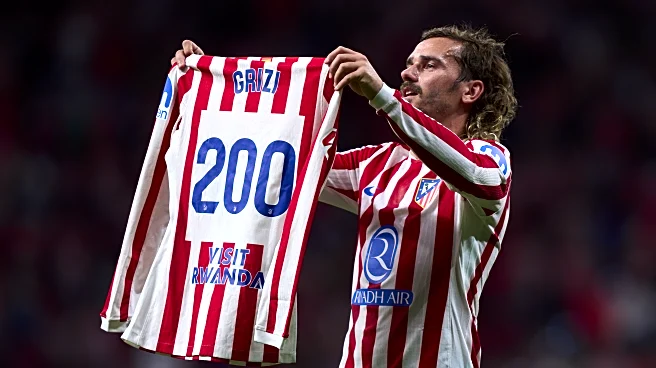Atlético Madrid secured a first Champions League victory this season by running out 5-1 winners against an overmatched Eintracht Frankfurt on Tuesday night, completing a clean sweep of three home wins in the past six days. Five different players scored goals as Atlético repeatedly carved open the visitors’ defense, and Antoine Griezmann hit the 200-goal mark for his Atleti career.
Here are three takeaways we can glean from this game, which marks only the third occasion on which Diego Simeone’s Atlético
have scored five or more goals in a Champions League home game.
Raspadori got Atleti moving
On his second start for the club, Giacomo Raspadori picked up his first goal, peeling away from midfielder Fares Chaibi and smashing a left-footed shot past the goalkeeper Kaua. It was just reward for how Raspadori has started his Atlético career; the Italy international has stood out as a diligent, intelligent, versatile, two-footed attacker.
But Raspadori got Atlético going in other ways. Switches of play, deft movement between the forward and midfield lines, a willingness to get stuck in (he claimed five ground duels and made four recoveries)…this was Jack’s day to steer the Atleti ship while Griezmann and Julián Alvarez eased their way into proceedings.
Raspadori was crucial to Atleti’s ability to maintain and pressure with an ultra-aggressive attacking shape. As my pal Emmanuel Lavogez pointed out during the first half, Atleti repeatedly generated numerical superiority in the final third by pushing Matteo Ruggeri and Giuliano Simeone high up the pitch while Raspadori and Griezmann repeatedly ran through small windows of space between the Frankfurt center-backs.
This 3-2-5 shape (with Marcos Llorente aiding in buildup as an additional center-back) created numerous crossing and set-piece opportunities — such as Atlético’s second goal, when Griezmann flicked an Alvarez corner to the back post for Robin Le Normand to tap in with his left foot.
A glimpse at Giuliano’s ceiling
Giuliano Simeone’s bullet header from an Alvarez corner on 70 minutes was Atlético’s second of three set-piece goals on the night. It marked the second Champions League goal of his young career (he opened the scoring in the 4-1 win at RB Salzburg in January) and further highlighted how, if he can develop this area of his game, Diego Simeone’s son could become an elite winger.
No one really questions Giuliano’s energy or physical attributes. But he gets a lot of stick for his end product, specifically his spotty finishing. Last season, Giuliano found the net just five times in 50 appearances, including the FIFA Club World Cup; two of those goals came in a Copa del Rey quarterfinal thumping of Getafe.
Despite missing big chances in wins over Villarreal and Rayo Vallecano, Giuliano has scored twice in nine games already this term. He may not have been credited with the assist for Raspadori’s opener, but he created the chance with a 1v1 dribble that opened space for him to cross the ball into the box. It was something he would not have been able to pull off last season.
Modern football demands a lot from wingers: these players have to be able to run endlessly, penetrate defenses through dribbles as well as crosses, provide assists for the center-forward, and score goals themselves. Still just 22 years old — and just over a year removed from his first start at the club — Giuliano is growing at a steady, more than acceptable rate. He solves more problems than he creates, and I think he is only going to get better from here.
Griezmann’s 200th goal
Finally. After enduring a seven-month barren run that encompassed 22 league games, Griezmann found the back of the net in second-half stoppage time against Real Madrid on Saturday — and on Tuesday, he scored a proper poacher’s goal off an assist from Alvarez (who had received a sumptuous through ball from Pablo Barrios) for his 200th in Atlético colors.
It has been 20 months since Griezmann broke Luis Aragonés’ scoring record with his 174th Atlético goal. Since then, the former France star has experienced one of the lowest valleys of his Atleti career. The lengthy goal drought saw fans turn against him, with vehemence not seen since his departure to — and return from — FC Barcelona. Even I expressed on That Atleti Podcast some reservations about Griezmann extending his contract to 2027 and forming part of this season’s squad, so concerning was his form in the back half of 2024/25.
After a shaky start to the new season, Griezmann now is settling in to a less-demanding rotational role. As Cholo Simeone said post-game, Griezmann’s talent has no age; his intelligence, typified by his tactical adaptability and trademark movement between lines, didn’t disappear all of a sudden. At 34 years old, he just doesn’t physically have the capacity to run 25 kilometers per week anymore, but Griezmann still can cause headaches for defenders and nab some headlines for himself.

Griezmann’s protagonismo on Tuesday allowed us to watch a different kind of Alvarez performance. La Araña showed off the other qualities that make him so complete, like the driving runs from his own half and his quality and choice of pass. Of course, he had to get among the goals too; his delicately-chipped Panenka off Kaua’s fingertips completed the scoring, the spot kick awarded thanks to a handball that Griezmann provoked.
















